Unit 1 Looking forwards Developing ideas课件(共26张PPT)--2024-2025学年高中《英语》选择性必修4(外研版)
文档属性
| 名称 | Unit 1 Looking forwards Developing ideas课件(共26张PPT)--2024-2025学年高中《英语》选择性必修4(外研版) | 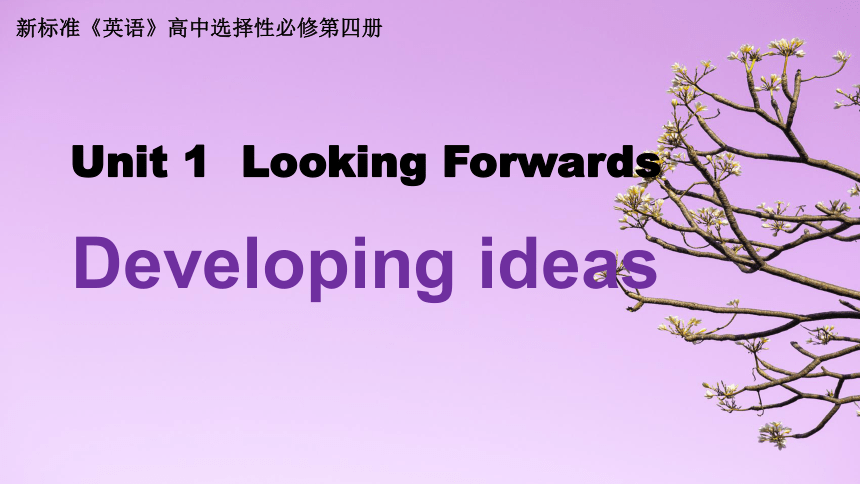 | |
| 格式 | pptx | ||
| 文件大小 | 2.8MB | ||
| 资源类型 | 教案 | ||
| 版本资源 | 外研版(2019) | ||
| 科目 | 英语 | ||
| 更新时间 | 2025-07-08 21:19:54 | ||
图片预览

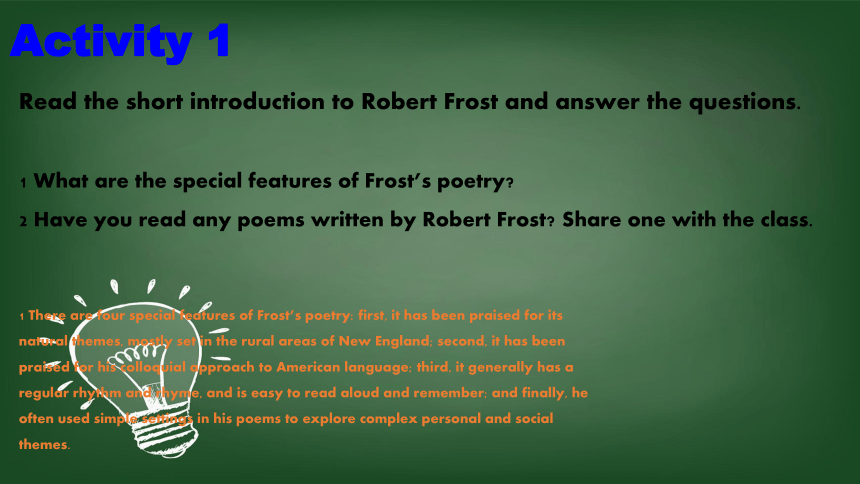
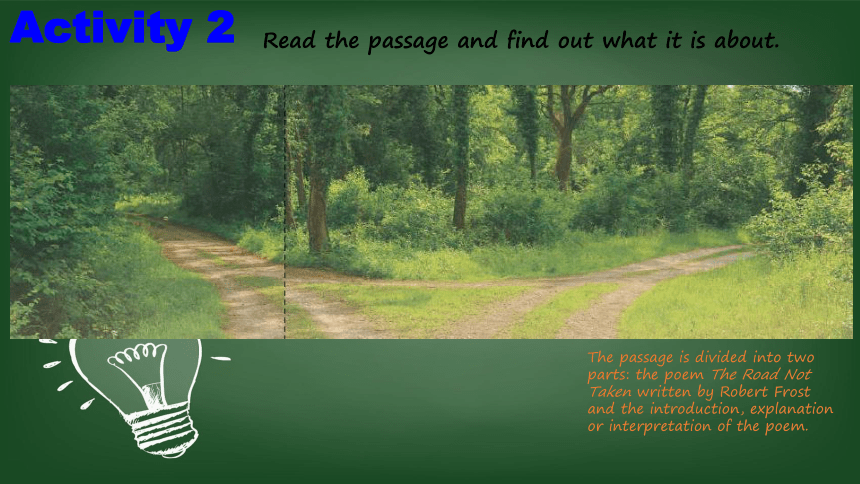
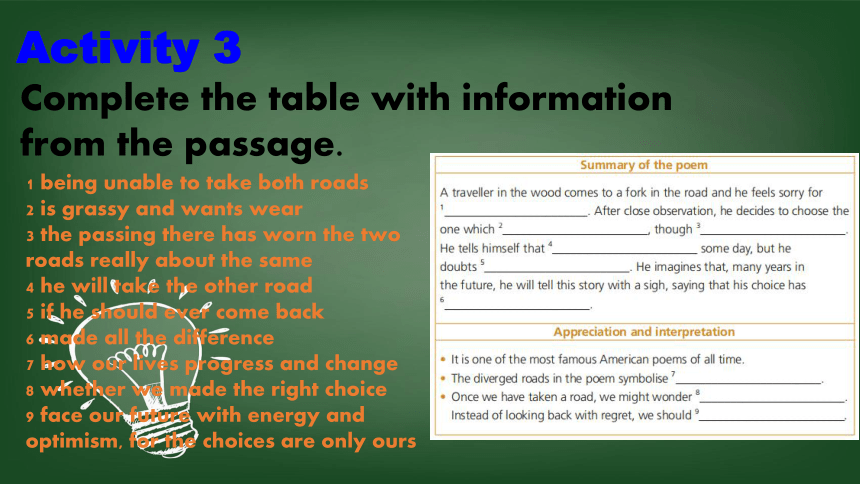
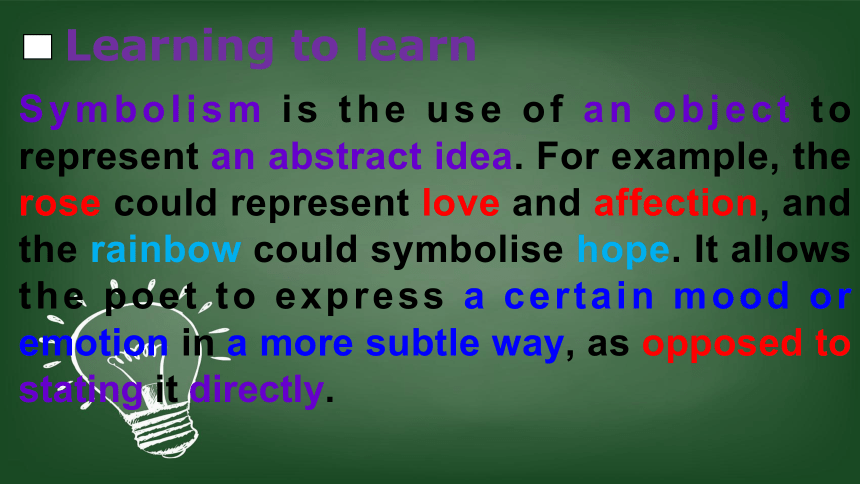
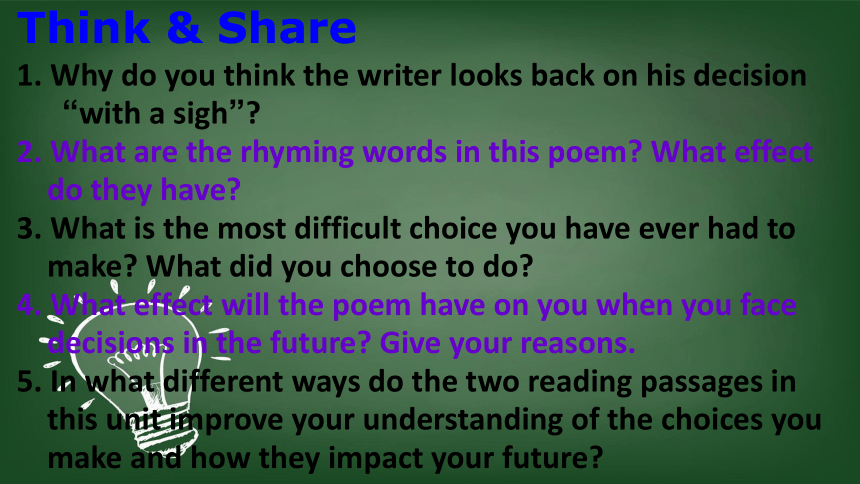
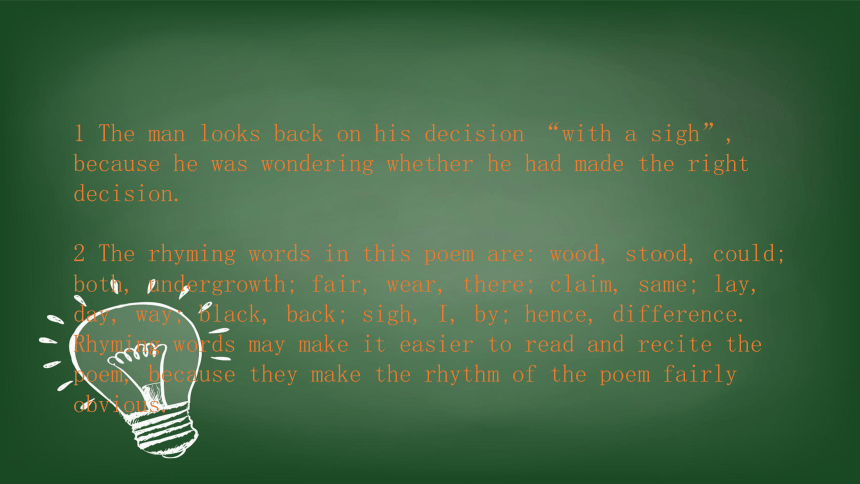
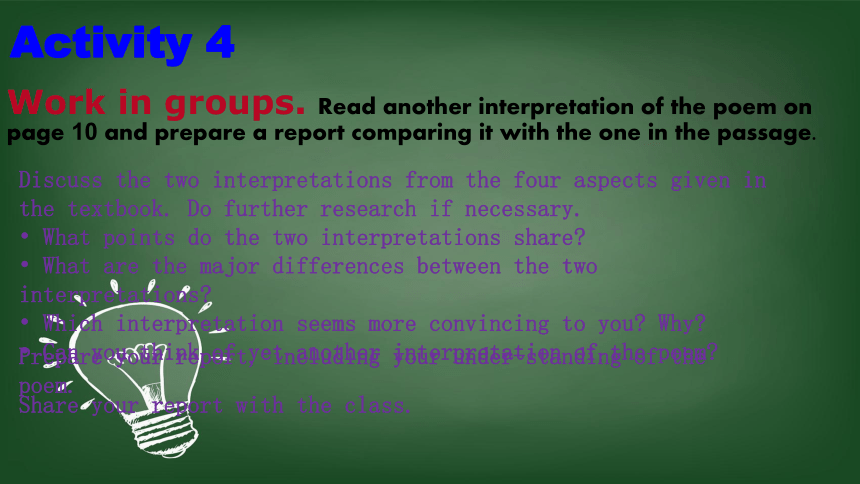
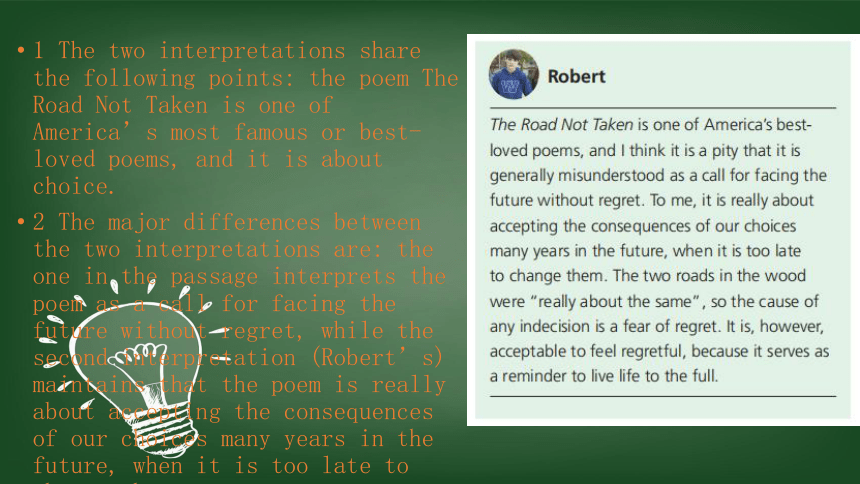
文档简介
(共26张PPT)
Unit 1 Looking Forwards
Developing ideas
新标准《英语》高中选择性必修第四册
Activity 1
Read the short introduction to Robert Frost and answer the questions.
1 What are the special features of Frost’s poetry
2 Have you read any poems written by Robert Frost Share one with the class.
1 There are four special features of Frost’s poetry: first, it has been praised for its natural themes, mostly set in the rural areas of New England; second, it has been praised for his colloquial approach to American language; third, it generally has a regular rhythm and rhyme, and is easy to read aloud and remember; and finally, he often used simple settings in his poems to explore complex personal and social themes.
Activity 2
Read the passage and find out what it is about.
The passage is divided into two parts: the poem The Road Not Taken written by Robert Frost and the introduction, explanation or interpretation of the poem.
Activity 3
Complete the table with information from the passage.
1 being unable to take both roads
2 is grassy and wants wear
3 the passing there has worn the two roads really about the same
4 he will take the other road
5 if he should ever come back
6 made all the difference
7 how our lives progress and change
8 whether we made the right choice
9 face our future with energy and optimism, for the choices are only ours
Learning to learn
Symbolism is the use of an object to represent an abstract idea. For example, the rose could represent love and affection, and the rainbow could symbolise hope. It allows the poet to express a certain mood or emotion in a more subtle way, as opposed to stating it directly.
Think & Share
1. Why do you think the writer looks back on his decision
“with a sigh”
2. What are the rhyming words in this poem What effect
do they have
3. What is the most difficult choice you have ever had to
make What did you choose to do
4. What effect will the poem have on you when you face
decisions in the future Give your reasons.
5. In what different ways do the two reading passages in
this unit improve your understanding of the choices you
make and how they impact your future
1 The man looks back on his decision “with a sigh”, because he was wondering whether he had made the right decision.
2 The rhyming words in this poem are: wood, stood, could; both, undergrowth; fair, wear, there; claim, same; lay, day, way; black, back; sigh, I, by; hence, difference. Rhyming words may make it easier to read and recite the poem, because they make the rhythm of the poem fairly obvious.
Activity 4
Work in groups. Read another interpretation of the poem on page 10 and prepare a report comparing it with the one in the passage.
Discuss the two interpretations from the four aspects given in the textbook. Do further research if necessary.
What points do the two interpretations share
What are the major differences between the two interpretations
Which interpretation seems more convincing to you Why
Can you think of yet another interpretation of the poem
Prepare your report, including your under-standing of the poem.
Share your report with the class.
1 The two interpretations share the following points: the poem The Road Not Taken is one of America’s most famous or best-loved poems, and it is about choice.
2 The major differences between the two interpretations are: the one in the passage interprets the poem as a call for facing the future without regret, while the second interpretation (Robert’s) maintains that the poem is really about accepting the consequences of our choices many years in the future, when it is too late to change them.
Writing an application letter
Activity 5
Read the job advertisement and the application letter. Match the headings to the sections and find out how qualified the applicant is for the job.
a Stating relevant past experience
b Ending by restating interest, as well as
contact information
c Stating qualifications required
d Formal signing off
e Formal greeting
f Stating personal interest and career choice
g Stating purpose of the letter, including
position applied for and how applicant came
to know about it.
( e – g –c– f – a – b – d)
Activity 6
1) What job are you applying for Where did you find the job vacancy
2) What previous experience makes you suitable for the job
3) What relevant qualifications and language skills do you have
Now write the application letter.
Read the job advertisement and plan for your application letter by answering the questions.
Activity 7
Work in pairs:
Make improvements to each other’s application letters, paying particular attention to the structure and language.
Dear Ms Lee,
I wish to apply for the position of office assistant as advertised in China News Report on 11 July.
I’m skilled in the use of computers, and I have a great interest in online technology. I believe my skills would enable me to contribute to the smooth operation of your office.
As I plan to work in an administrative post after graduation, I would welcome the opportunity to gain experience in this field. As stated in my attached CV, I am well prepared for a variety of tasks, including document filing, photocopying and arranging refreshments. English is my native language, and I’m majoring in French at university.
Although I have not held the position of office assistant before, I did work in a major department store for a few weeks, five days per week on morning shift, and I was regarded as a valuable addition to the sales team. I am capable of learning quickly, and willing to start with the basics wherever it is necessary.
Should you consider me a suitable candidate to interview, I’m contactable at your convenience at samhanson@ or by phone on 8969-7616. Thank you for your time and consideration.
Yours faithfully,
Sam Hanson
参考范文
Unit 1 Looking Forwards
Understanding ideas
新标准《英语》高中选择性必修第四册
Activity 1
Complete the questionnaire and share your answers with the class.
SENIOR HIGH QUESTIONNAIRE
Now you’ve been at senior high for over a year, I’d like to know your progress and plans for the future. Thank you!
Your Form Teacher
How do you feel about your performance over the
previous terms
satisfied
so-so
not satisfied
Why
What goals have you achieved
What goals have you yet to achieve
What will you do about the goals you want to achieve?
How do you plan to achieve these goals
Activity 2
Look at the title and predict what the passage is about.
Different jobs people might do in the future.
Stories about different people’s future.
Various possibilities for future development.
Fixed future for everyone.
Now read the passage and check your prediction.
Activity 3
Match the questions to the paragraphs and find out the answers.
a What is possibly the most important concern in life
b What was Doyle’s main writing ambition
c What can you do when faced with uncertainty about the future
d What is the relationship between one’s plans and the future
e Why was Doyle disappointed with the success of his Holmes stories
f What did Hemingway do to achieve his ambition to become a writer
a–1 b–4 c–6 d–2 e–5 f–3
Activity 4
Organise information from the passage and complete the chart.
He was born in the US in 1899.
He _____________ since
boyhood.
He wrote _____________.
He won _____________.
He was born in Scotland in 1859.
He first work as _____________
but _______________.
He created _____________ , Sherlock Holmes .
He had wanted to be remembered for ___________ but ___________.
Ernest Hemingway
Arthur Conan Doyle
Similarities
They are both ____________. They share ____________.
Ernest Hemingway
has been single-minded in his ambition to write
novels and short stories based on his personal experiences of the First World War, the Spanish Civil War, bullfighting and deep-sea fishing, among others
the Pulitzer Prize for Fiction in 1953 and won the Nobel Prize in Literature later
Arthur Conan Doyle
a doctor; Doyle’s main ambition was to become a writer of historical novels
the fictional detective
his historical novels amongst other academic works; the public couldn’t get enough of Sherlock Holmes
Similarities
were ultimately successful
the same ambitious and energetic approach to life
Activity 4
Now read the sentence from the passage and answer the questions.
So, whatever twists and turns you might encounter, take a leaf out of the books of these two authors and be prepared for the unexpected.
1 What is your understanding of “take a leaf out of the books”
2 What effect is the author aiming to achieve by using it
3 What other expressions do you know that share the same meaning
1 My understanding of “take a leaf out of the books” is to copy the way someone else behaves because you want to be like them or be as successful as they are. It is a metaphor based on books, it is also a pun, because it appears in a text about writers.
2 The author aims to maintain the reader’s interest by using this figure of speech, and perhaps to end on a lighter note by using a pun.
Think & Share
1 What is your understanding of Steve Jobs’ words at the end of the
passage
2 What can you learn about facing the future from the two authors
3 What will you do to prepare yourself for the future
4 Do you know any stories about Chinese writers and their plans for
the future What lessons can you learn from their experiences Share your opinions with the class.
1 You cannot make sense of your life by looking forward, because the future has not happened yet, and the meaning of future events is therefore uncertain. However, once future events have occurred, you may be able to see how they fit into the pattern of your life. Things which you did not expect to be important may turn out to be very important. You must face the future by believing that everything will work out in the end, and that your life will make sense and have meaning.
thank you
感谢观看
Unit 1 Looking Forwards
Developing ideas
新标准《英语》高中选择性必修第四册
Activity 1
Read the short introduction to Robert Frost and answer the questions.
1 What are the special features of Frost’s poetry
2 Have you read any poems written by Robert Frost Share one with the class.
1 There are four special features of Frost’s poetry: first, it has been praised for its natural themes, mostly set in the rural areas of New England; second, it has been praised for his colloquial approach to American language; third, it generally has a regular rhythm and rhyme, and is easy to read aloud and remember; and finally, he often used simple settings in his poems to explore complex personal and social themes.
Activity 2
Read the passage and find out what it is about.
The passage is divided into two parts: the poem The Road Not Taken written by Robert Frost and the introduction, explanation or interpretation of the poem.
Activity 3
Complete the table with information from the passage.
1 being unable to take both roads
2 is grassy and wants wear
3 the passing there has worn the two roads really about the same
4 he will take the other road
5 if he should ever come back
6 made all the difference
7 how our lives progress and change
8 whether we made the right choice
9 face our future with energy and optimism, for the choices are only ours
Learning to learn
Symbolism is the use of an object to represent an abstract idea. For example, the rose could represent love and affection, and the rainbow could symbolise hope. It allows the poet to express a certain mood or emotion in a more subtle way, as opposed to stating it directly.
Think & Share
1. Why do you think the writer looks back on his decision
“with a sigh”
2. What are the rhyming words in this poem What effect
do they have
3. What is the most difficult choice you have ever had to
make What did you choose to do
4. What effect will the poem have on you when you face
decisions in the future Give your reasons.
5. In what different ways do the two reading passages in
this unit improve your understanding of the choices you
make and how they impact your future
1 The man looks back on his decision “with a sigh”, because he was wondering whether he had made the right decision.
2 The rhyming words in this poem are: wood, stood, could; both, undergrowth; fair, wear, there; claim, same; lay, day, way; black, back; sigh, I, by; hence, difference. Rhyming words may make it easier to read and recite the poem, because they make the rhythm of the poem fairly obvious.
Activity 4
Work in groups. Read another interpretation of the poem on page 10 and prepare a report comparing it with the one in the passage.
Discuss the two interpretations from the four aspects given in the textbook. Do further research if necessary.
What points do the two interpretations share
What are the major differences between the two interpretations
Which interpretation seems more convincing to you Why
Can you think of yet another interpretation of the poem
Prepare your report, including your under-standing of the poem.
Share your report with the class.
1 The two interpretations share the following points: the poem The Road Not Taken is one of America’s most famous or best-loved poems, and it is about choice.
2 The major differences between the two interpretations are: the one in the passage interprets the poem as a call for facing the future without regret, while the second interpretation (Robert’s) maintains that the poem is really about accepting the consequences of our choices many years in the future, when it is too late to change them.
Writing an application letter
Activity 5
Read the job advertisement and the application letter. Match the headings to the sections and find out how qualified the applicant is for the job.
a Stating relevant past experience
b Ending by restating interest, as well as
contact information
c Stating qualifications required
d Formal signing off
e Formal greeting
f Stating personal interest and career choice
g Stating purpose of the letter, including
position applied for and how applicant came
to know about it.
( e – g –c– f – a – b – d)
Activity 6
1) What job are you applying for Where did you find the job vacancy
2) What previous experience makes you suitable for the job
3) What relevant qualifications and language skills do you have
Now write the application letter.
Read the job advertisement and plan for your application letter by answering the questions.
Activity 7
Work in pairs:
Make improvements to each other’s application letters, paying particular attention to the structure and language.
Dear Ms Lee,
I wish to apply for the position of office assistant as advertised in China News Report on 11 July.
I’m skilled in the use of computers, and I have a great interest in online technology. I believe my skills would enable me to contribute to the smooth operation of your office.
As I plan to work in an administrative post after graduation, I would welcome the opportunity to gain experience in this field. As stated in my attached CV, I am well prepared for a variety of tasks, including document filing, photocopying and arranging refreshments. English is my native language, and I’m majoring in French at university.
Although I have not held the position of office assistant before, I did work in a major department store for a few weeks, five days per week on morning shift, and I was regarded as a valuable addition to the sales team. I am capable of learning quickly, and willing to start with the basics wherever it is necessary.
Should you consider me a suitable candidate to interview, I’m contactable at your convenience at samhanson@ or by phone on 8969-7616. Thank you for your time and consideration.
Yours faithfully,
Sam Hanson
参考范文
Unit 1 Looking Forwards
Understanding ideas
新标准《英语》高中选择性必修第四册
Activity 1
Complete the questionnaire and share your answers with the class.
SENIOR HIGH QUESTIONNAIRE
Now you’ve been at senior high for over a year, I’d like to know your progress and plans for the future. Thank you!
Your Form Teacher
How do you feel about your performance over the
previous terms
satisfied
so-so
not satisfied
Why
What goals have you achieved
What goals have you yet to achieve
What will you do about the goals you want to achieve?
How do you plan to achieve these goals
Activity 2
Look at the title and predict what the passage is about.
Different jobs people might do in the future.
Stories about different people’s future.
Various possibilities for future development.
Fixed future for everyone.
Now read the passage and check your prediction.
Activity 3
Match the questions to the paragraphs and find out the answers.
a What is possibly the most important concern in life
b What was Doyle’s main writing ambition
c What can you do when faced with uncertainty about the future
d What is the relationship between one’s plans and the future
e Why was Doyle disappointed with the success of his Holmes stories
f What did Hemingway do to achieve his ambition to become a writer
a–1 b–4 c–6 d–2 e–5 f–3
Activity 4
Organise information from the passage and complete the chart.
He was born in the US in 1899.
He _____________ since
boyhood.
He wrote _____________.
He won _____________.
He was born in Scotland in 1859.
He first work as _____________
but _______________.
He created _____________ , Sherlock Holmes .
He had wanted to be remembered for ___________ but ___________.
Ernest Hemingway
Arthur Conan Doyle
Similarities
They are both ____________. They share ____________.
Ernest Hemingway
has been single-minded in his ambition to write
novels and short stories based on his personal experiences of the First World War, the Spanish Civil War, bullfighting and deep-sea fishing, among others
the Pulitzer Prize for Fiction in 1953 and won the Nobel Prize in Literature later
Arthur Conan Doyle
a doctor; Doyle’s main ambition was to become a writer of historical novels
the fictional detective
his historical novels amongst other academic works; the public couldn’t get enough of Sherlock Holmes
Similarities
were ultimately successful
the same ambitious and energetic approach to life
Activity 4
Now read the sentence from the passage and answer the questions.
So, whatever twists and turns you might encounter, take a leaf out of the books of these two authors and be prepared for the unexpected.
1 What is your understanding of “take a leaf out of the books”
2 What effect is the author aiming to achieve by using it
3 What other expressions do you know that share the same meaning
1 My understanding of “take a leaf out of the books” is to copy the way someone else behaves because you want to be like them or be as successful as they are. It is a metaphor based on books, it is also a pun, because it appears in a text about writers.
2 The author aims to maintain the reader’s interest by using this figure of speech, and perhaps to end on a lighter note by using a pun.
Think & Share
1 What is your understanding of Steve Jobs’ words at the end of the
passage
2 What can you learn about facing the future from the two authors
3 What will you do to prepare yourself for the future
4 Do you know any stories about Chinese writers and their plans for
the future What lessons can you learn from their experiences Share your opinions with the class.
1 You cannot make sense of your life by looking forward, because the future has not happened yet, and the meaning of future events is therefore uncertain. However, once future events have occurred, you may be able to see how they fit into the pattern of your life. Things which you did not expect to be important may turn out to be very important. You must face the future by believing that everything will work out in the end, and that your life will make sense and have meaning.
thank you
感谢观看
